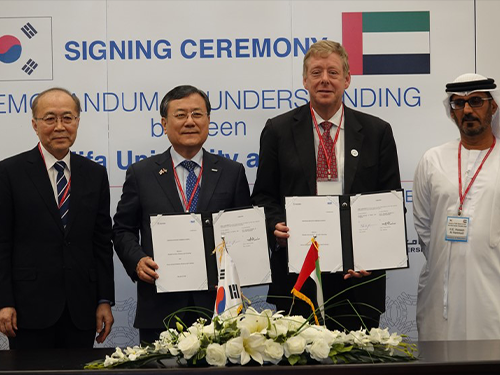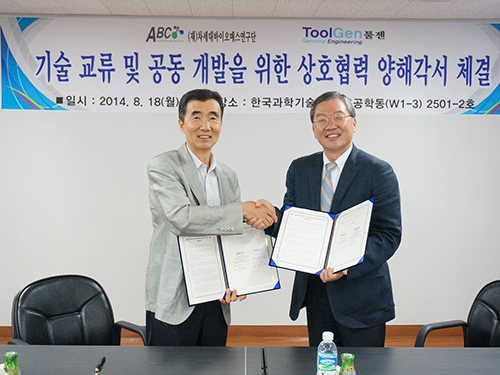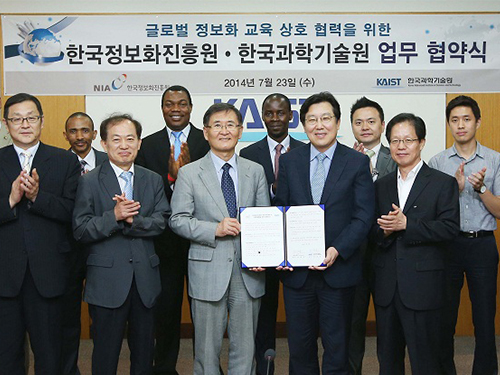memorandum+of+understanding
-
 KAIST-KU Sign MOU on 4th Industrial Technology Development
(President Shin(second from left) poses with Khalifa University President Tod Laursen after signing an MOU in the UAE on March 25. Far left is Chairman of the NST Kwangyun Wohn and far right is the UAE Minister of Educatiion Hussain Al Hammadi.)
KAIST President Sung-Chul Shin and Khalifa University Interim President Tod Laursen signed an MOU on the Fourth Industrial Technology Development on March 25 in the UAE.
They signed the MOU during the UAE-ROK Nuclear Friendship and KAIST Alumni Night at Khalifa University co-hosted by KAIST and the Korea Atomic Energy Research Institute (KAERI). The MOU will bring new opportunities to further expand bilateral cooperation in education and training in the relevant technologies called for the era of the Fourth Industrial Revolution.
More than 100 dignitaries including Chairman of National Research Council of Science and Technology (NST) in Korea Dr. Kwangyun Wohn, President of KAERI Jaejoo Ha, the UAE Minister of Education His Excellency Hussain Al Hammadi, Minister of State for Advanced Sciences Her Excellency Sarah bint Yousef Al Amiri, and His Excellency Federal Authority for Nuclear Regulation (FANR) Director General Christopher Viktorsson attended the event. In particular, a significant number of Emirati graduates of the KUSTAR-KAIST education program and many others who completed various KAIST training programs joined the event.
The Nuclear Friendship Night was celebrating the completion of the first nuclear power plant in Barakah exported by Korea. This is the first nuclear reactor in the Middle East, which is to start operation later this year. The event also coincided with Korean President Moon Jae-In’s state visit to the UAE.
KAIST and KAERI gathered distinguished leaders from the higher education and nuclear industries at the event in response to the UAE government’s top national agenda of fostering future talents and promoting the nuclear industry in order to ensure energy security.
KAIST and Khalifa University signed an initial agreement in education and research in 2009 when the governments of Korea and the UAE signed a contract to build four nuclear power plants in Barakah. Since then, the two universities have worked together closely in the areas of nuclear engineering, bio-medical engineering, robotics, mechanical engineering, chemical engineering, and materials science. With this signing on the new MOU, the partnership between the two institutions will mark the second phase of educating high-caliber human resources in science and technology of the two countries.
The KAIST Alumni Night also brought more opportunities to appreciate the achievements that the two countries have made through collaboration in education and research, mostly represented in the field of nuclear technology between KAIST and Khalifa University. During the event, KAIST graduates also shared their experiences from the education at KAIST, followed by the welcoming speeches from the UAE Minister of Education and the UAE Minister of State for Advanced Sciences.
KAIST President Shin, in his welcoming speech at the event, said, “I look forward to more students in the UAE having the opportunity to experience the world’s top-level education and global environment that KAIST offers. The collaboration with Khalifa University and the UAE is very important for building both countries’ future growth.”
KU President Laursen said, “This MOU on research cooperation focusing on technologies for the Fourth Industrial Revolution, nuclear engineering, and other technical areas will further consolidate our partnership with KAIST and support us in developing human capital suitable to take on future challenges in the science and technology sectors. We firmly believe the talent pool of experts created by this initiative will contribute to the overall economic growth of the UAE.”
2018.03.26 View 11495
KAIST-KU Sign MOU on 4th Industrial Technology Development
(President Shin(second from left) poses with Khalifa University President Tod Laursen after signing an MOU in the UAE on March 25. Far left is Chairman of the NST Kwangyun Wohn and far right is the UAE Minister of Educatiion Hussain Al Hammadi.)
KAIST President Sung-Chul Shin and Khalifa University Interim President Tod Laursen signed an MOU on the Fourth Industrial Technology Development on March 25 in the UAE.
They signed the MOU during the UAE-ROK Nuclear Friendship and KAIST Alumni Night at Khalifa University co-hosted by KAIST and the Korea Atomic Energy Research Institute (KAERI). The MOU will bring new opportunities to further expand bilateral cooperation in education and training in the relevant technologies called for the era of the Fourth Industrial Revolution.
More than 100 dignitaries including Chairman of National Research Council of Science and Technology (NST) in Korea Dr. Kwangyun Wohn, President of KAERI Jaejoo Ha, the UAE Minister of Education His Excellency Hussain Al Hammadi, Minister of State for Advanced Sciences Her Excellency Sarah bint Yousef Al Amiri, and His Excellency Federal Authority for Nuclear Regulation (FANR) Director General Christopher Viktorsson attended the event. In particular, a significant number of Emirati graduates of the KUSTAR-KAIST education program and many others who completed various KAIST training programs joined the event.
The Nuclear Friendship Night was celebrating the completion of the first nuclear power plant in Barakah exported by Korea. This is the first nuclear reactor in the Middle East, which is to start operation later this year. The event also coincided with Korean President Moon Jae-In’s state visit to the UAE.
KAIST and KAERI gathered distinguished leaders from the higher education and nuclear industries at the event in response to the UAE government’s top national agenda of fostering future talents and promoting the nuclear industry in order to ensure energy security.
KAIST and Khalifa University signed an initial agreement in education and research in 2009 when the governments of Korea and the UAE signed a contract to build four nuclear power plants in Barakah. Since then, the two universities have worked together closely in the areas of nuclear engineering, bio-medical engineering, robotics, mechanical engineering, chemical engineering, and materials science. With this signing on the new MOU, the partnership between the two institutions will mark the second phase of educating high-caliber human resources in science and technology of the two countries.
The KAIST Alumni Night also brought more opportunities to appreciate the achievements that the two countries have made through collaboration in education and research, mostly represented in the field of nuclear technology between KAIST and Khalifa University. During the event, KAIST graduates also shared their experiences from the education at KAIST, followed by the welcoming speeches from the UAE Minister of Education and the UAE Minister of State for Advanced Sciences.
KAIST President Shin, in his welcoming speech at the event, said, “I look forward to more students in the UAE having the opportunity to experience the world’s top-level education and global environment that KAIST offers. The collaboration with Khalifa University and the UAE is very important for building both countries’ future growth.”
KU President Laursen said, “This MOU on research cooperation focusing on technologies for the Fourth Industrial Revolution, nuclear engineering, and other technical areas will further consolidate our partnership with KAIST and support us in developing human capital suitable to take on future challenges in the science and technology sectors. We firmly believe the talent pool of experts created by this initiative will contribute to the overall economic growth of the UAE.”
2018.03.26 View 11495 -
 KAIST Partners with Science-focused Universities in Korea for Student Exchange Programs
KAIST and four science-focused universities in Korea (Pohang University of Science and Technology, Gwangju Institute of Science and Technology, Daegu Gyeongbuk Institute of Science and Technology, and Ulsan National Institute of Science and Technology) agreed to exchange programs during academic semesters including summer and winter terms by signing a memorandum of understanding (MOU) on November 28, 2014. The signing ceremony took place at the KAIST campus with the participation of academic affairs deans from all five universities.
Based on the agreement, KAIST students can take up to 12 credits of coursework at any of the said universities and have unimpeded access to the university facilities during their coursework.
Dean Hyun-Wook Park of Academic Affairs at KASIT said, “Through exchange programs, students can capitalize on each university’s advantages, and this eventually will lead to greater advancement in science and technology in the nation.”
2014.12.08 View 8761
KAIST Partners with Science-focused Universities in Korea for Student Exchange Programs
KAIST and four science-focused universities in Korea (Pohang University of Science and Technology, Gwangju Institute of Science and Technology, Daegu Gyeongbuk Institute of Science and Technology, and Ulsan National Institute of Science and Technology) agreed to exchange programs during academic semesters including summer and winter terms by signing a memorandum of understanding (MOU) on November 28, 2014. The signing ceremony took place at the KAIST campus with the participation of academic affairs deans from all five universities.
Based on the agreement, KAIST students can take up to 12 credits of coursework at any of the said universities and have unimpeded access to the university facilities during their coursework.
Dean Hyun-Wook Park of Academic Affairs at KASIT said, “Through exchange programs, students can capitalize on each university’s advantages, and this eventually will lead to greater advancement in science and technology in the nation.”
2014.12.08 View 8761 -
 KAIST's Advanced Biomass R&D Center and ToolGen will cooperate
The Advanced Biomass R&D Center (ABC) at KAIST and ToolGen, Inc., a Korean biotechnology company focused on the development of engineered nucleases that can be used as essential tools for editing genetic information in microbial, plant, animal, and human cells, signed a memorandum of understanding (MOU) on August 18, 2014 for technology exchange and research collaboration.
ABC is headed by Executive Director Ji-Won Yang, a professor emeritus at the Department of Chemical and Biomolecular Engineering, and Chief Executive Officer Jong-Moon Kim for ToolGen.
The newly signed MOU encourages collaborations in the following areas:
- Development of genome editing technology for microalgae modification
- Development of microalgae that increases biofuel production through the
application of genome editing technology
- Creation of education and training programs for researchers
- Collaboration in other areas
In addition, the two organizations decided to cooperate in the improvement of biofuel yields using ToolGen’s genome editing technology, the commercialization of research outcomes, and the development of eco-friendly biofuels from biomass.
Executive Director Yang commented that “improving biofuel production is crucial to accelerate the commercialization of biofuels, and collaborating with ToolGen will help us realize that goal.” He further said that “The importance of this MOU lies in the fact that the global chemical industry including Korea has been making substantial efforts to shift its attention from a fossil fuel-based development to a more bio-based technology.”
Jin-Soo Kim, the director of the Genome Editing Research Center at the Institute of Basic Sciences in Korea and the cofounder of ToolGen, added that “ToolGen has successfully commercialized its third generation genetic scissors, which shows a lot of promise for commercialization. Our collaboration with KAIST will serve as the driving force to create new industries and accordingly, new jobs.”
2014.09.03 View 11899
KAIST's Advanced Biomass R&D Center and ToolGen will cooperate
The Advanced Biomass R&D Center (ABC) at KAIST and ToolGen, Inc., a Korean biotechnology company focused on the development of engineered nucleases that can be used as essential tools for editing genetic information in microbial, plant, animal, and human cells, signed a memorandum of understanding (MOU) on August 18, 2014 for technology exchange and research collaboration.
ABC is headed by Executive Director Ji-Won Yang, a professor emeritus at the Department of Chemical and Biomolecular Engineering, and Chief Executive Officer Jong-Moon Kim for ToolGen.
The newly signed MOU encourages collaborations in the following areas:
- Development of genome editing technology for microalgae modification
- Development of microalgae that increases biofuel production through the
application of genome editing technology
- Creation of education and training programs for researchers
- Collaboration in other areas
In addition, the two organizations decided to cooperate in the improvement of biofuel yields using ToolGen’s genome editing technology, the commercialization of research outcomes, and the development of eco-friendly biofuels from biomass.
Executive Director Yang commented that “improving biofuel production is crucial to accelerate the commercialization of biofuels, and collaborating with ToolGen will help us realize that goal.” He further said that “The importance of this MOU lies in the fact that the global chemical industry including Korea has been making substantial efforts to shift its attention from a fossil fuel-based development to a more bio-based technology.”
Jin-Soo Kim, the director of the Genome Editing Research Center at the Institute of Basic Sciences in Korea and the cofounder of ToolGen, added that “ToolGen has successfully commercialized its third generation genetic scissors, which shows a lot of promise for commercialization. Our collaboration with KAIST will serve as the driving force to create new industries and accordingly, new jobs.”
2014.09.03 View 11899 -
 Cooperation Agreement with Korea's National Information Society Agency on Global Information Education
KAIST and the National Information Society Agency (NIA) signed a memorandum of understanding (MOU) to launch global information education cooperation. President Steve Kang and President Kwang-Soo Chang of NIA, attended the signing ceremony held at KAIST on July 23, 2014.
Under the MOU, KAIST and NIA will jointly develop contents for global information education; plan and operate educational programs; provide consulting services to train experts in information; and implement exchange programs for faculty and students.
In addition, the two organizations plan to cooperate in the establishment of a network, consisting of alumni and students from the Global Information and Telecommunications Technology Program at KAIST (KAIST ITTP), to deliver a Korean model of electronic government (e-government) to other nations worldwide.
President Kang said, “Korea is one of the most wired nations in the world. By working with the NIA, we hope to have an opportunity to export our knowledge and experiences in the construction of e-governments to less technologically advanced nations by becoming a good precedent for them.”
Since 2006, KAIST has invited 20-30 government officials from underdeveloped or developing countries each year, offering them enrollment in graduate programs at KAIST ITTP.
2014.07.25 View 8220
Cooperation Agreement with Korea's National Information Society Agency on Global Information Education
KAIST and the National Information Society Agency (NIA) signed a memorandum of understanding (MOU) to launch global information education cooperation. President Steve Kang and President Kwang-Soo Chang of NIA, attended the signing ceremony held at KAIST on July 23, 2014.
Under the MOU, KAIST and NIA will jointly develop contents for global information education; plan and operate educational programs; provide consulting services to train experts in information; and implement exchange programs for faculty and students.
In addition, the two organizations plan to cooperate in the establishment of a network, consisting of alumni and students from the Global Information and Telecommunications Technology Program at KAIST (KAIST ITTP), to deliver a Korean model of electronic government (e-government) to other nations worldwide.
President Kang said, “Korea is one of the most wired nations in the world. By working with the NIA, we hope to have an opportunity to export our knowledge and experiences in the construction of e-governments to less technologically advanced nations by becoming a good precedent for them.”
Since 2006, KAIST has invited 20-30 government officials from underdeveloped or developing countries each year, offering them enrollment in graduate programs at KAIST ITTP.
2014.07.25 View 8220